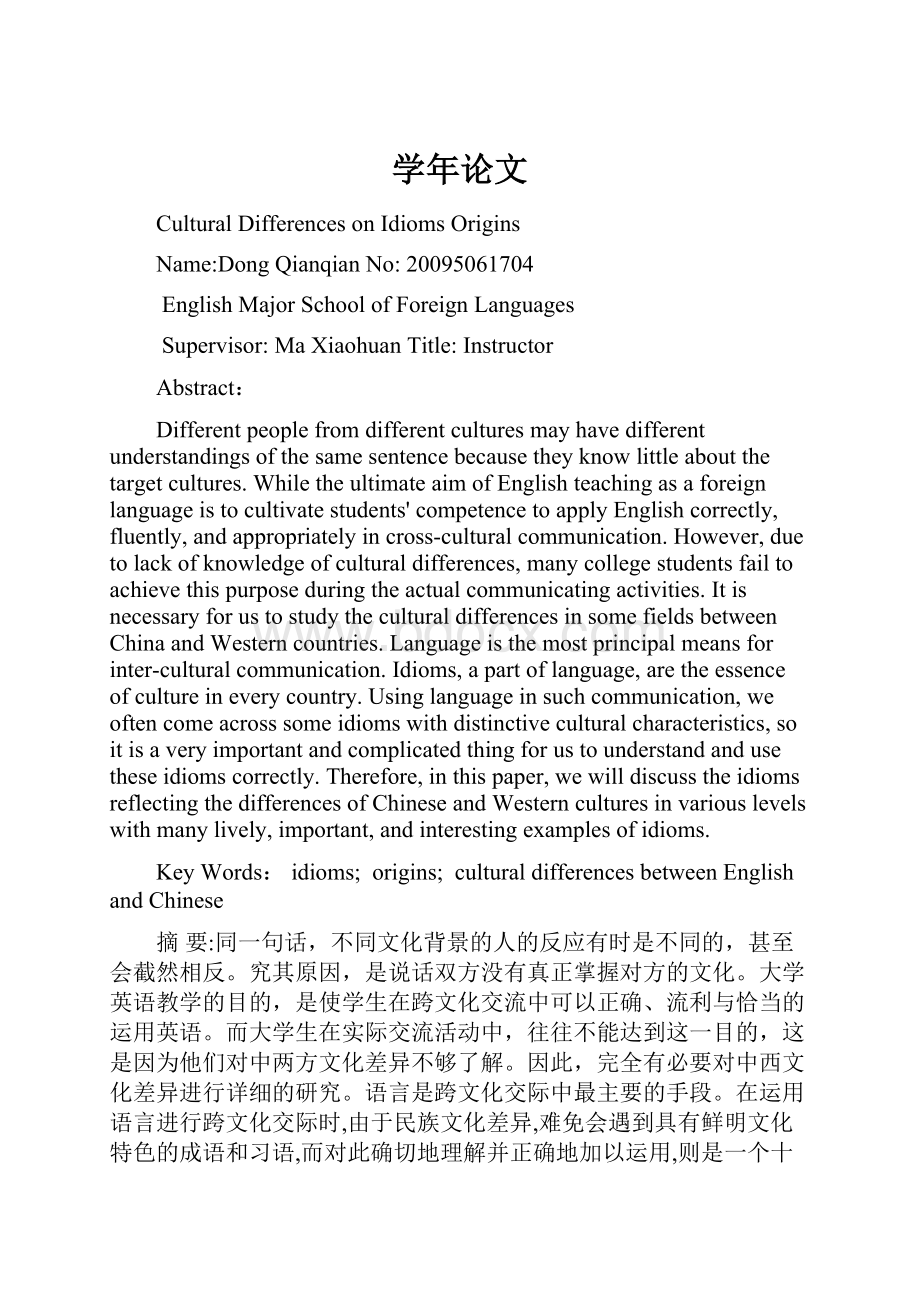 学年论文.docx
学年论文.docx
- 文档编号:27495044
- 上传时间:2023-07-02
- 格式:DOCX
- 页数:10
- 大小:85.45KB
学年论文.docx
《学年论文.docx》由会员分享,可在线阅读,更多相关《学年论文.docx(10页珍藏版)》请在冰豆网上搜索。

学年论文
CulturalDifferencesonIdiomsOrigins
Name:
DongQianqianNo:
20095061704
EnglishMajorSchoolofForeignLanguages
Supervisor:
MaXiaohuanTitle:
Instructor
Abstract:
Differentpeoplefromdifferentculturesmayhavedifferentunderstandingsofthesamesentencebecausetheyknowlittleaboutthetargetcultures.WhiletheultimateaimofEnglishteachingasaforeignlanguageistocultivatestudents'competencetoapplyEnglishcorrectly,fluently,andappropriatelyincross-culturalcommunication.However,duetolackofknowledgeofculturaldifferences,manycollegestudentsfailtoachievethispurposeduringtheactualcommunicatingactivities.ItisnecessaryforustostudytheculturaldifferencesinsomefieldsbetweenChinaandWesterncountries.Languageisthemostprincipalmeansforinter-culturalcommunication.Idioms,apartoflanguage,aretheessenceofcultureineverycountry.Usinglanguageinsuchcommunication,weoftencomeacrosssomeidiomswithdistinctiveculturalcharacteristics,soitisaveryimportantandcomplicatedthingforustounderstandandusetheseidiomscorrectly.Therefore,inthispaper,wewilldiscusstheidiomsreflectingthedifferencesofChineseandWesternculturesinvariouslevelswithmanylively,important,andinterestingexamplesofidioms.
KeyWords:
idioms;origins;culturaldifferencesbetweenEnglishandChinese
摘要:
同一句话,不同文化背景的人的反应有时是不同的,甚至会截然相反。
究其原因,是说话双方没有真正掌握对方的文化。
大学英语教学的目的,是使学生在跨文化交流中可以正确、流利与恰当的运用英语。
而大学生在实际交流活动中,往往不能达到这一目的,这是因为他们对中两方文化差异不够了解。
因此,完全有必要对中西文化差异进行详细的研究。
语言是跨文化交际中最主要的手段。
在运用语言进行跨文化交际时,由于民族文化差异,难免会遇到具有鲜明文化特色的成语和习语,而对此确切地理解并正确地加以运用,则是一个十分重要而又复杂的问题。
习语是各国文化的精髓,反映各国的风俗习惯。
因此,本文从最能体现中西文化差异的习语着手,论述习语在文化的各个层次上所反映的中西文化差异,并采纳大量生动有趣的例子作为论据进行适当的分析。
关键词:
习语;来源;英语;汉语;文化差异
1.Introduction
Languageisinseparablefromculture.Foronething,languageisapartofcultureandplaysanimportantroleinit.Foranother,asamirrorofculture,languageisstronglyinfluencedandshapedbyculture;meanwhile,itreflectsculture.Idiomsincludemetaphoricalphrases,slang,colloquialism,proverbandsoon.Asanessentialpartofthelanguageandcultureofasociety,idiomsarecharacterizedbytheirconciseexpressions,richandvivid,involvinggeography,history,religiousbelief,livingconventionsandsoon.Theyareusuallyhighlyspecializedinmeaningandcloselytiedtodistinctiveculturalfeaturesandculturalattitudes.Itisbelievedthatidiomsarethemostculturallyloadedelementinanylanguage'svocabulary.Undoubtedlytheyareoftenhardtounderstandandhardertousecorrectly.EnglishandChineseidioms,closelyrelatedtotheirownculture,conveydifferentculturalfeaturesandmessagesoftheirownnation,reflectingtheirownculture.(胡文仲,1999,P281-282)ThereexistsvastdifferencebetweenEnglishandChinesecultureandthisdifferenceoccursinEnglishandChineseidioms,too.Basedonothers’research,thispaperintendstoexploreitbyfullyanalyzingthemainculturalreasonscausingidiomaticexpressionsdifferencesinbothChineseandEnglish.
2.Differentlivingcircumstance
Thatcultureisdeterminedbygeographicalenvironmentisasubjectiveviewofgeographicaldeterminism.Itcannotbedenied,however,thatnaturalenvironmentincludinggeographicalposition,climate,ecologicalconditionissomethingthatplayscontributoryroleintheformationofaculture.Peopledwellinginacertainregiontrytoadaptthemselvestothesurroundingssothatlivelihoodcanbemaintained.Asaresult,theirspecialwayofliving,thinkingandbehavingisformedasaside-productoftheirrelationshipwiththeenvironment.
2.1.Geographicalenvironment
Britainisanislandcountry.Peoplewholivealongseacoastandwhoselivelihoodisdependentontheseawillhaveidiomsaboutwater,sailing,islandandfish.Forexample,wespeakinChinese挥金如土,butweshouldrenderitintoEnglishas"spendmoneylikewater".TherearealotofEnglishidiomsaboutship,waterandfish:
"ascloseasanoyster"(守口如瓶),"castananchortowindward"(未雨绸缪),"atsea"(茫然),"tokeepone'sheadabovewater"(奋力图存),"totakethewindoutofsomebody'ssail"(先发制人),"towerone'ssail"(甘拜下风),"infullsail"(全力以赴),"sailunderfalsecolors"(欺世盗名),"halfseaover"(酒喝得太多),"fishbeginstostinkatthehead"(上梁不正下梁歪),"neveroffertoteachfishtoswim"(不要班门弄斧),"dullfish"(枯燥无味的人);"plainsailing"(一帆风顺),"totrimone'ssailtothewind"(见风使舵),"tobeinthesameboat"(同舟共济),"toburnone'sboat"(破釜沉舟),"abigfishinalittlepond"(山中无老虎,猴子称霸王).(江瑞,2000,P110)
Ontheotherhand,theHanPeopleliveonland,theybelongtoanagrariansocietythatplacesagriculturalproductionatthetopofthenationalagenda,regardingindustryandcommerceasthenon-essentials.Duringthelonghistoryoffarming,theChineselanguagehasaccumulatedlargenumbersoffarmers'idioms,like二人同心,黄土变金(Whentwopeopleareofthesamemind,evenclaymaybechangedintogold),上无片瓦,下无寸土(aspoorasachurchmouse),人不亏地,地不亏人(Themaster'sfootstepsfattenthesoil),瓜熟蒂落(Thingswillbeeasilysettledwhenconditionsareripe),瑞雪兆丰年(atimelysnowpromisesagoodharvest),五谷丰登(abundantharvestofallfoodcrops),种瓜得瓜,种豆得豆(asamansows,soshallhereap),四体不勤,五谷不分(canneitherdophysicalworknordistinguishricefromwheat).(朱丽玲,2000,P99)
2.2.Climate
Climateisanotherfactorinthelivingcondition.WhileBritainislocatedinwesternhemisphere,withNorthTemperateZoneandmarineclimate,so"westwind"isthesymbolofspring.ThefamousEnglishpoetShirley's"OdetoWestWind"isapraisingsongofspring.SummerinBritainisawarmandcomfortableseason,whichisusuallylinkedwith"lovely","gentle"and"nice".Shakespearecompareslovertoasummerinoneofhispoems,"shallIcomparetheetoasummer'sday?
Thouartmorelovelyandmoretemperate."(Shakespeare’sSonnet18)ThewestwindblowsfromtheAtlanticOceanaswarmandgentleasChineseeastwindandbringsvoluminousraintothisarea.SothatBritainaboundsinraincanbeprovedinsomeidiomsconcerningrain:
"tomakehaywhilethesunshines"(趁热打铁),"rainyday"(穷困时期),"torainorshine"(无论如何),"toraincatsanddogs"(倾盆大雨),"asrightasrain"(非常正确),etc.Britainusedtobeknownasacountryoffogpartlyduetothedampnessandwarmnessoftheweatherconditionandpartlytotheairpollutionassideproductoftheindustrialrevolution.Therefore,inEnglishtherearesomeidiomaticexpressionsconcerningfog,suchas"inafog"(云里雾里),and"tohavenotthefoggiestidea"."Springuplikemushrooms"(雨后春笋)maybecomeincomprehensibletoChineselearnerifheisunawarethatthisidiomimpliestherichnessofmushroomgrowinginthewetareainBritainjustas"bamboo"inChinesespecialty,and"asplentifulasblackberries"(黑莓遍地)alsoindicatestheecologicalenvironmentinBritain,forblackberriesareeasilyavailableinEngland.
InChineseculture,"eastwind"is"thewindofspring";springiswarmandcolorful,anditisregardedasthebeginningofalllives.TherearemanyidiomsinChina,whichrefertospring:
春暖花开(inwarmspring,alltheblossomsareinfullbloom.),春意盎然(springisverymuchintheair),一年之计在于春(thewholeyear’sworkconsistsinagoodstartinspring),万紫千红总是春(itisspringwhenthegayestcoloursabound).Springhastheimageofgoodthings,soChinese“春”isusedinsomeidiomstoexpressthis:
满面春风(one’sfaceradiateshappiness),春风化雨(thelife-givingspringbreezeandrain---salutaryinfluenceofeducation).Summerisalwaysconnectedwithextremelyhotortheintenseheat,so赤日炎炎似火烧(theblazingsunscorcheslikefire)、骄阳似火(theburningsunislikeafire)aretermsoftenusedtodescribesummer.
Sodifferentlivingsurroundingsmayproducedifferentidiomsanddifferentculture.
3.Differenttraditionsandcustoms
Cultureislongacquiredfromcustomsandhabits.Thesecustomsandhabitsarerepresentativeofthewayoflivingofacertainspeechcommunityandtheyaremirroredinthehabitualspeakingofthelanguage.
3.1.Foodandcooking
FoodisoneoftheaspectsofculturaltraditionthatarereflectedinEnglishidioms.InmostEuropeancountries,wheatusedforbakingbread,barleyforbrewingwineandoatforfeedinganimalsarethemajorsupplyoffood.Bread,butter,jam,cheese,etc.areusualkindoffoodindailymeals.Breadisoneofthesuppliesforliving.So"toearnoneabread"means"tomakealiving"."Breadandbutter"(日常所需),asmajorfoodoftheWesternersisalsoanidiommeaning"theusualneedsoflife"."Toknowwhichsideone’sbreadisbuttered"(知道自身利益所在)isaninterestingidiomimplying"toknowwhereone’sinterestlies".Tobutterbothsidesofone'sbreadmaysatisfyaperson'sappetitebetter,so"tobutterbothsidesofone'sbread"(过舒适的生活)isusedtomean"toobtainancomfortableliving".Itiscertainlyabadluckifsomeonehastoeathardcheese,so"hardcheese"(倒霉)gotitsmeaning"badluck."
InChina,mostoftheareasespeciallythesouthgrowrice,somanyidiomshavetodowithrice:
巧妇难为无米之炊(Eventhecleveresthousewifecan'tcookamealwithoutrice),茶余饭后(overacupofteaorafterdinner---atone'sleisure),不当家不知柴米贵(Hewhotakeschargeknowstheresponsibility),看菜吃饭,量体裁衣(toadaptoneselftocircumstances).ChinahasalonghistoryofcookingandtheChineseareknownasthemostcriticalandatthesametimethemostcausaleaters,fortheyattachgreaterimportancetofoodthananyotherpeople,asisreflectedinthesayingslike:
家常便饭(dailyfoodpreparation),粗茶淡饭(coarseteaandbrownrice),大鱼大肉(abundantfishandmeat---richfood),添油加醋(toexaggerateembellishmentto),画饼充饥(todrawcakestoallayhunger),鸡毛蒜皮(aninchbreaksnosquare),生米煮成熟饭(What'sdonecannotbeundone).SuchexpressionsarequiteabundantintheChineselanguage.Inourdailylife,theChineseusuallygree
- 配套讲稿:
如PPT文件的首页显示word图标,表示该PPT已包含配套word讲稿。双击word图标可打开word文档。
- 特殊限制:
部分文档作品中含有的国旗、国徽等图片,仅作为作品整体效果示例展示,禁止商用。设计者仅对作品中独创性部分享有著作权。
- 关 键 词:
- 学年 论文
 冰豆网所有资源均是用户自行上传分享,仅供网友学习交流,未经上传用户书面授权,请勿作他用。
冰豆网所有资源均是用户自行上传分享,仅供网友学习交流,未经上传用户书面授权,请勿作他用。


 《崔万志演讲观后感》.docx
《崔万志演讲观后感》.docx
